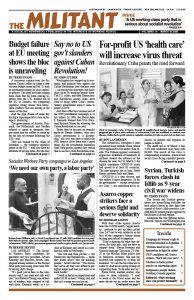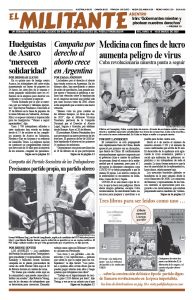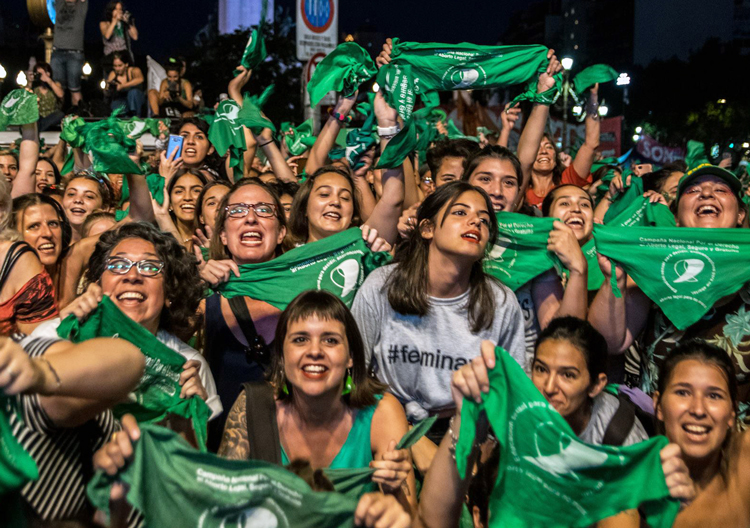Led by young women, fighters for abortion rights are on the move in Argentina. In the past few years they have organized a series of large mobilizations, won growing support and forced a first-ever vote on legalization in the National Congress that lost by only a few votes in 2018. This vote came just a few months after hundreds of thousands marched in cities across the country on International Women’s Day, March 8. Now they’re pressing to win a new vote.
“I have been active in this campaign for 15 years and we have seen a huge change over the recent period, I would say since 2015,” Victoria Tesoriero, a spokesperson for the National Campaign for the Right to Legal, Safe and Free Abortion, told the Militant by phone from Buenos Aires Feb. 28. “The next few days are very important to us. The president opens this session of Congress March 1 and he says he will present a bill to legalize abortion.”
The details of the bill President Alberto Fernández will introduce have not yet been made public. The 2018 bill would have made abortion legal in the first 14 weeks of pregnancy.
“We organized a big mobilization Feb. 19 with tens of thousands participating across the country to put pressure on the government and the president,” Tesoriero said.
Young women lead the way
The growing strength of the movement and popularity of the campaign reflect a transformation in people’s attitudes. Tesoriero said an important change is how widely and openly abortion is discussed today, as opposed to before when nobody talked about it.
“We have a new generation joining. Most significant is the number of young women, 15, 16, 17 years old. They play a key role in winning others, including their mothers and other family members,” she said. “And we have international support. While Congress debated in 2018 there were actions in front of Argentine embassies in 100 cities around the world.”
In today’s mobilizations, chants like “It’s my body, I decide” are popular, reflecting the view that the fight is a question of equal protection under the law and a democratic right for women.
“We have always campaigned that abortion is a health issue,” Tesoriero said. “We believe this is how you can win support broadly among the general public.” Under Argentina’s current law abortion is legal only in cases of rape or risk to a woman’s life or health. Women in the ruling class and middle classes can afford to end an unwanted pregnancy by seeing costly doctors in the big cities or outside the country. But working-class women and those living in rural areas are forced to turn to “clandestine” abortions, the leading cause of maternal death in the country today.
The forces leading the opposition are Catholic and evangelical church officials. The Catholic bishops conference has launched a campaign, “Yes to woman, yes to life,” to stop the decriminalization. Their next action against changing the law will be a Mass on International Women’s Day in the national shrine of Our Lady of Luján, patroness of Argentina.
Growing numbers of Catholics do not follow the call of the bishops, a reflection of the broader changes in public opinion in recent years. Catholics for Choice is one of the stronger groups marching for abortion rights today.
Fight to broaden support
“But one thing we are trying to do is take abortion out of being seen as only part of the feminist agenda,” Tesoriero said. “We’re reaching out to win other organizations, like unions in factories and industries, where men mostly work. Workers in the public health sector have organized and affiliated with us, which is very important.”
Another challenge she said is to win support in rural areas. “I don’t think women in the countryside are organized.”
But women there are being won to the fight. In 2007, 20-year-old Anna María Acevedo, mother of three children in the province of Santa Fe, died in a cesarean delivery 22 weeks into her pregnancy, as did her fetus. Diagnosed with cancer, she was refused treatment on grounds that radiotherapy could hurt the fetus. Her case focused national and international attention on Argentina’s laws.
“Her mother has now become a supporter of legalizing abortion and campaigns in the countryside,” Tesoriero said. “People like her will lead the way to others in rural areas.”


